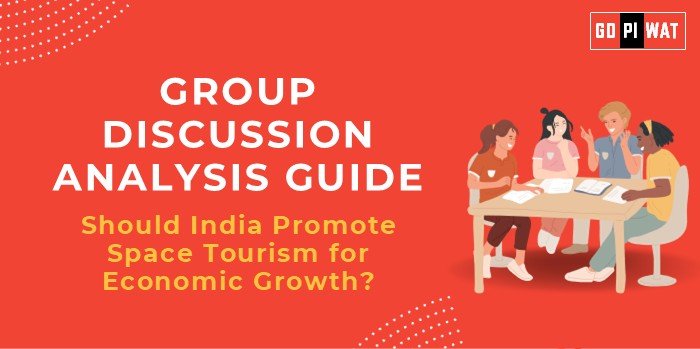📋 Group Discussion (GD) Analysis Guide
🚀 Should India Promote Space Tourism for Economic Growth?
🌐 Introduction to the Topic
Opening Context: Space tourism is emerging as a futuristic industry, with nations like the US and Russia leading the charge. For India, a developing space program combined with a growing economy presents a unique opportunity to explore this niche sector for economic growth.
Topic Background: India’s space endeavors, led by ISRO, have already demonstrated cost-effective innovations with missions like Chandrayaan and Mangalyaan. Globally, space tourism has gained momentum, with companies like SpaceX and Blue Origin offering private space travel. For India, venturing into this domain could symbolize technological prowess and economic ambition.
📊 Quick Facts and Key Statistics
- Global Space Tourism Revenue: Projected to reach $8.5 billion by 2030, highlighting a growing market.
- ISRO’s Cost Efficiency: Chandrayaan-3 cost $74 million, significantly less than global counterparts.
- Indian Space Economy: Valued at $7 billion in 2024, with potential to reach $50 billion by 2030.
- Growth in Tourism: India’s tourism sector contributed 5.8% to GDP in 2023, emphasizing a ready ecosystem.
🤝 Stakeholders and Their Roles
- ISRO: Research, development, and infrastructure for space tourism initiatives.
- Government: Policy-making, funding, and collaboration with private players.
- Private Companies: Partnerships for technology, innovation, and operational efficiency.
- Citizens: Consumers of the service and beneficiaries of associated economic growth.
- Global Organizations: Collaboration and benchmarking with established space tourism leaders.
🎯 Achievements and Challenges
Achievements:
- Cost-effective space missions showcasing global competitiveness.
- Skilled workforce and technical expertise available domestically.
- Expanding middle class with disposable income to explore luxury services like space tourism.
Challenges:
- High initial investment in space infrastructure.
- Ensuring passenger safety in uncharted territory.
- Potential environmental concerns like space debris and carbon emissions.
🌍 Global Comparisons
- Success in the US: Companies like SpaceX and Blue Origin leading the space tourism market.
- Challenges in Russia: Limited commercial outreach despite technological advancement.
- Case Study: Chandrayaan-3’s success demonstrated ISRO’s capability to compete globally at a fraction of the cost.
📌 Structured Arguments for Discussion
- Supporting Stance: “India’s entry into space tourism will unlock high-value jobs, enhance technological innovation, and contribute to GDP growth.”
- Opposing Stance: “The focus should remain on pressing issues like poverty and healthcare instead of luxury sectors like space tourism.”
- Balanced Perspective: “While space tourism offers economic opportunities, a phased approach with public-private collaboration can balance priorities.”
💡 Effective Discussion Approaches
- Opening Approaches:
- Start with a global trend: “Space tourism is an $8.5 billion industry set to redefine travel.”
- Use a national perspective: “With ISRO’s cost-efficient technologies, India can lead the space tourism market in Asia.”
- Counter-Argument Handling:
- “Safety concerns are valid, but ISRO’s track record ensures reliability.”
- “Initial costs are high, but government subsidies and private investments can mitigate this burden.”
📈 Strategic Analysis (SWOT)
- Strengths: Proven cost-efficient space missions; skilled technical workforce.
- Weaknesses: Limited infrastructure for commercial space travel; high development costs.
- Opportunities: Attracting global tourists; developing ancillary industries like aerospace engineering.
- Threats: International competition; environmental concerns.
📚 Connecting with B-School Applications
- Real-World Applications: Developing business strategies for niche markets; policy-making for balancing innovation and inclusivity.
- Sample Interview Questions:
- “How can space tourism contribute to India’s GDP?”
- “What are the ethical concerns surrounding space tourism?”
- Insights for B-School Students: Explore business models in emerging sectors; analyze policy frameworks for tech-driven industries.


